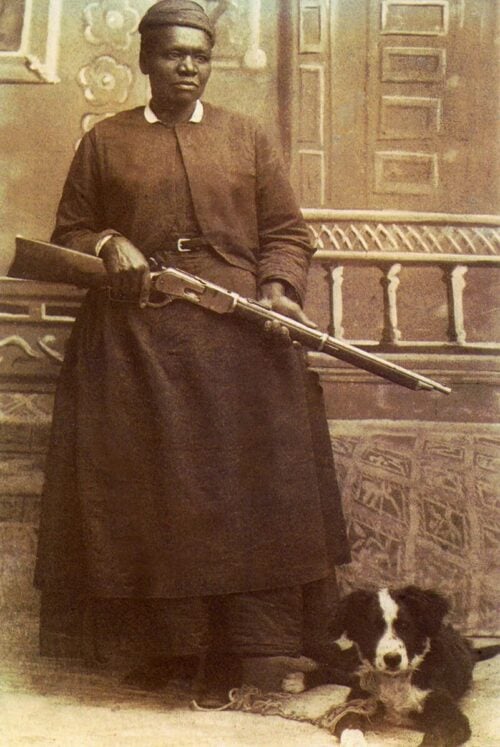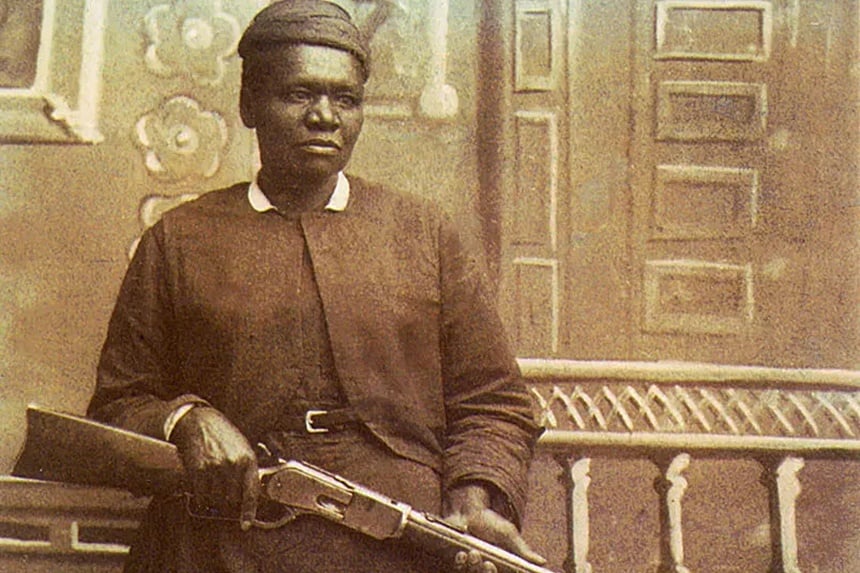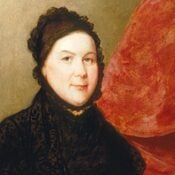“I like to be rough. I like to be rowdy. I also like to be loving….I like to baby sit.”
—Mary Fields
Mary Fields was as beloved as she was feared. Few people dared challenge the six-foot-tall, 200-pound former slave who carried a gun, drank, and had a hot temper. Despite her formidable image, Fields loved children, helped others, and carried the mail through the blizzards of northern Montana.
Born into slavery around 1832 in Hickman County, Tennessee and freed after the Civil War, Fields later found work as a chambermaid on the Mississippi steamboat Robert E. Lee. There she met Judge Edmund Dunne, who hired her as a servant in his household. After his wife’s death, Dunne sent Fields and his five children to live with his sister, Sara, or Mary Amadeus, Mother Superior of the Ursuline convent in Toledo, Ohio around 1874. There the former slave and the nun became fast friends. According to the Toledo Blade, legend has it that when Fields arrived in Toledo, Mother Amadeus asked if she needed anything, to which her friend replied, “Yes, a good cigar and a drink.”

The following year, Mother Amadeus was sent to Montana Territory to establish a school for indigenous girls at St. Peter’s Mission, west of the town of Cascade. When Fields learned that Mother Amadeus was stricken with pneumonia, she moved to Montana and nursed the nun back to health. After that, the 52-year-old Fields volunteered at the convent, hauling stones to build the school, fetching supplies from nearby towns, washing the convent’s laundry, tending to its many chickens, managing the kitchen, and maintaining the mission’s garden and grounds. (While she lived at the convent, Fields refused to be paid for her work, preferring to come and go as she pleased.)
In contrast to her altruism, Fields disliked being crossed and was reputed to have “the temperament of a grizzly bear.” the Ursuline archivist Sister Mary Grace Connelly said that during Mary’s time at the Toledo convent, she “had such a temper, the girls were afraid to come to school.” One of Fields’ chores was mowing the convent’s grass. “God help anyone who walked on the lawn after Mary had cut it,” Sister Connolly added. Later when Fields was living at St. Peter’s Mission in Montana, a school girl reported with horror that she “drinks whiskey and she swears.”
Fields’ strength and spunk made her known as “perhaps the most remarkable” of the Black women in the West, according to The Adventures of the Negro Cowboys. Despite her gender and race, she enjoyed frequenting taverns and arguing politics with men. It was also said that she could knock out any man with one punch and never lost that bet. One day, Fields got into an argument with a ranch foreman over a harness; she pelted him with a rock, leaving a dent in his head. “She could whip any two men in the territory…and had a fondness for hard liquor that was matched only by her capacity to put it away,” recalled movie star Gary Cooper, who grew up in nearby Dearborn, Montana and met Fields when he was a child.
Despite Fields’ rough and tumble ways and fondness for drink and cigars, she was determined to protect the convent and the wellbeing of the nuns, and the nuns were so fond of her that she continued to work at the mission for a decade.
In 1894, when Fields argued with a janitor who refused to “take orders from a n****r woman,” she pulled out her pistol and shot at him. That incident coupled with earlier reports convinced the territory’s bishop to order the sisters to “send that black woman away.” But as Sister Kathleen, the Ursuline Archivist at St. Peter’s, explained, “She got in trouble with the bishop, not with the nuns….The nuns loved her.” To help the now unemployed and homeless Fields, Mother Amadeus moved her to nearby Cascade and helped her find a job.
In 1895, the 60-year-old Fields was awarded a star route carrier contract. That made her second woman and the first African-American female to work as a contractor for the U.S. Postal Service. Contracts were awarded by the Postmaster General to a bidder who guaranteed “faithful performance” delivering the mail. Identified by three stars on postal registers, the roads were known as star routes.
Over the next eight years, Fields delivered the U.S. mail from Cascade to St. Peter’s Mission without missing a day. To accomplish that, Fields had to hitch six horses to a stagecoach (which weighed 2,400 pounds before the mail was loaded) and drive 14 miles through the rough terrain between the two locations.
Nothing — bad weather, problems with the horses or the coach, illness — stopped Fields from delivering the mail, leading residents to nickname her Stagecoach Mary. To ward off thieves, bandits, and wolves across the rough terrain, she carried a .38 Smith & Wesson and another firearm. When the snow became too deep for the horses, she wore snowshoes and lugged heavy sacks of mail on her shoulders. Once when a pack of wolves frightened her horses and overturned her wagon, Fields stood watch all night to protect the mail. Another time a surprise blizzard swept over the route, preventing her from continuing along the trail. As the temperatures plunged below zero, Fields saved herself and the horses from freezing by pacing back and forth all night.
When she was around 70, Fields retired from her mail duties and settled in Cascade, where the residents admired her for her fearlessness and generosity. Although never a mother herself, she loved children and became one of the town’s most popular babysitters. Parents paid her $1.50 a day to watch their children, but she used the money to buy candy for the kids. Relentlessly independent, she opened a laundry to support herself. Once when a customer refused to pay his $2.00 bill, she chased him down an alley and beat him up.” He doesn’t owe me two dollars anymore,” Fields told others.
In her later years, Fields became the mascot for Cascade’s baseball team and made buttonhole bouquets from her garden for each player. Those who made homeruns received full bouquets. As a symbol of the town’s appreciation, the restaurants offered her free meals, and the saloons let her drink at no charge. In 1912 when her home and laundry burned down, the Cascade citizens volunteered to rebuild it. After Fields’ death at 81 or 82 years of age on December 5, 1914, so many people attended her funeral that it was said to be the largest the town ever had. In remembrance, citizens raised money to have her buried in a cemetery along the road linking their town to St. Peter’s Mission.
By then Stagecoach Mary was already becoming a legend, a foul-mouthed, pistol-packing, no-nonsense Black woman with a heart of gold who, against all odds, faithfully delivered the mail to a remote town in Montana. As Gary Cooper wrote in 1959, Fields “was born a slave but lived to become one of the freest souls ever to draw a breath or a .38”
Become a Saturday Evening Post member and enjoy unlimited access. Subscribe now




Comments
Mary Fields was NOT an African-American woman. The term “African-American” was not in use until the mid-1970’s. Mary Fields was a Black woman, a term in use at that time to describe women of African descent. There was no intentional disrespect in using that term.
Her grit reminds me of Harriet Tubman.
Mary Fields has to be one of the most remarkable women and/or people, in American history. I had to read the feature twice (almost bug-eyed) to take it all in, her life’s story is that astonishing! Her accomplishments against all odds, and temperament might seem to contradict themselves, and they do, but don’t. Now I’M contradicting myself, but hopefully here it’s forgivable.